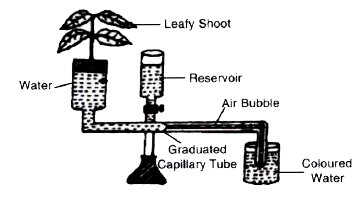Complete Solutions to SECTION-I of chapter SAMPLE QUESTION PAPER 3 of Class 10 book with complete answers and questions
| Class 10 | BIOLOGY |
| Chapter | SAMPLE QUESTION PAPER 3 |
| OSWAL | SECTION-I |
| Number Of Questions | 28 |
| Academic Year | 2023-24 |
Give the biological/technical terms for the following:
The stage of cell division in which the nuclear membrane disappears and the chromosomes become short and thick.
View SolutionThe exchange of chromatid parts between the maternal and paternal chromatids of a pair of homologous chromosomes during meiosis.
View SolutionRewrite by inserting key word in the space indicated by '^'.
Osmosis is the movement of water molecules from its region of high concentration to its region of low concentration through a ^ membrane .
View SolutionName the following :
The process by wh ich root hairs absorb water from the soil.
View SolutionThe permanently open structures seen on the bark of an old woody stem
View SolutionMention the exact function of:
Hydathodes.
View Solutiondefine Iris.
View SolutionDefine Eustachian tube.
View SolutionDefine Lymphocytes.
View SolutionDefine Coronary artery
View SolutionThe diagram of an apparatus given below demonstrates a particular process in plants. Study the same and answer the questions that follow :

Name the apparatus.
View SolutionKaryokinesis, S-phase, cytokinesis, `G_1`-phase, `G_2`-phase (cell cycle).
View SolutionWrite in a logical sequence
Endodermis, Cortex, Soil water, Xylem, Root hair
View SolutionWrite in a logical sequence
Cortical cells, roots hair, soil water, endodermis, xylem (entry of water into the plant from the soil).
View SolutionRewrite in a correct logical sequence :
Pinna, cochlea, tympanum, ear ossicles, auditory canal (route through which vibrations of sound enters the ear).
View SolutionRewrite in a correct logical sequence :
Pinna, cochlea, tympanum, ear ossicles, auditory canal (route through which vibrations of sound enters the ear).
View SolutionDifferentiate between the following pairs on the basis of what is mentioned within the bracket.
Turgor pressure and wall pressure (Explain)
View SolutionDifferentiate between the following pair on the basis of what is mentioned within bracket
photolysis and photophosphorylation ( definition)
View SolutionVentricular systole and Ventricular diastole. (Type of heart sound produced)
View SolutionDifferentiate between the following pairs on the basis of what is indicated within the brackets: Bicuspid valve and tricuspid valve. (Function)
View SolutionTabulate differences between:
LUBB and DUP (Names of valves whose closure produce sound
View SolutionGive specific/biological reasons for the following statements.
A person after consuming alcohol walks clumsily.
View SolutionGive biological reason for the following:
The wall of the ventricle is thicker than the auricles,
View SolutionGive biological reason for the following:
The left ventricle of the heart has a thicker wall than the right ventricle.
View SolutionXerophytes have their leaves modified to spines or reduced in size. Explain.
View SolutionGive reason for the following
Green leaves are thin and broad.
View SolutionGive exact location and function of
Thylakoids
View SolutionState the main function of
(i) Guard cells.
(ii) Thrombocytes.
(iii) Chordae tendineae.
(iv) beta-cells of pancreas.
(v) Cerebrospinal fluid.
View Solution
SECTION-I questions and complete solutions for chapter SAMPLE QUESTION PAPER 3 of EVERGREEN BIOLOGY (ENGLISH) of Class 10